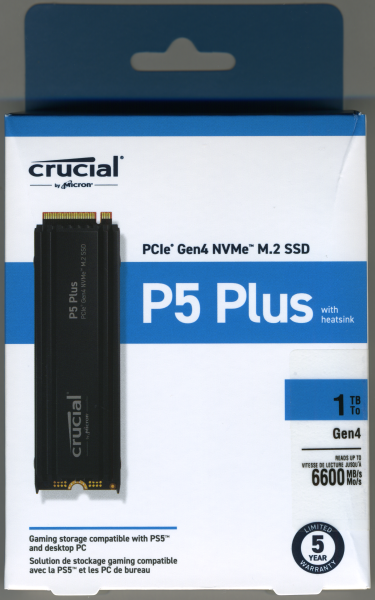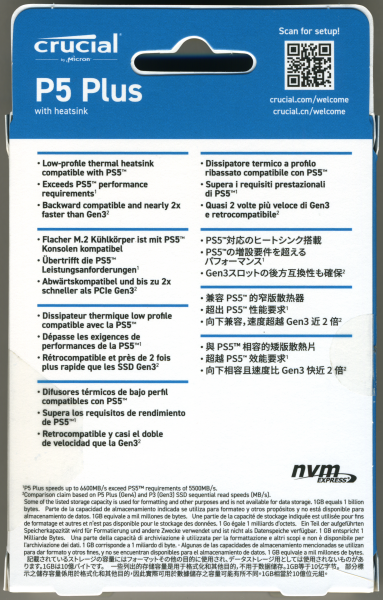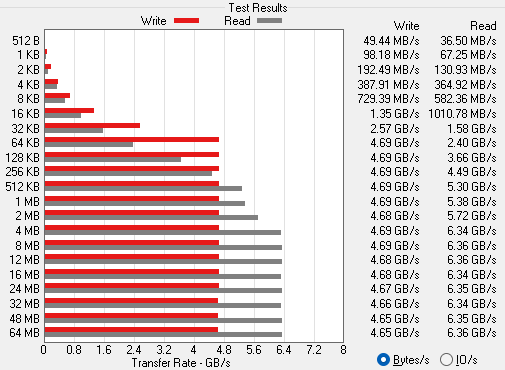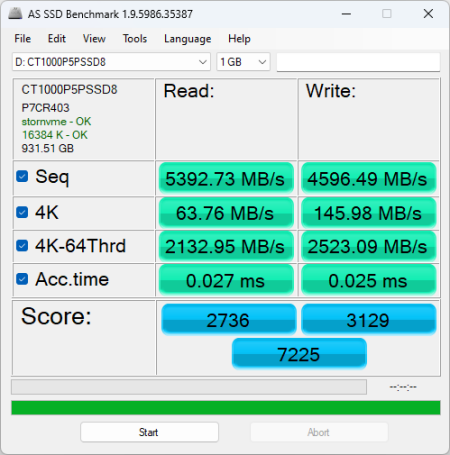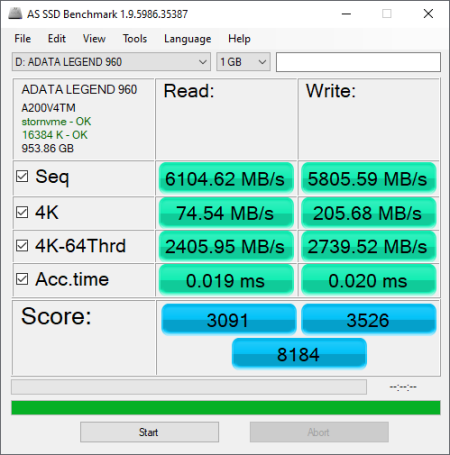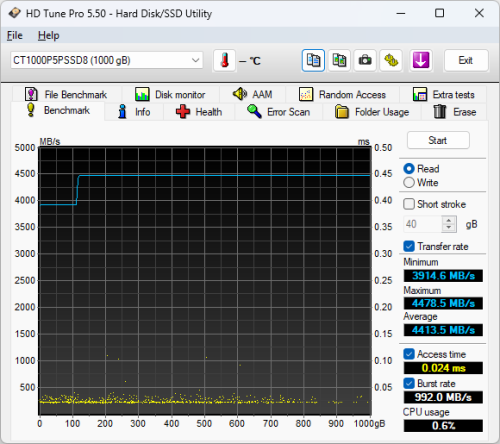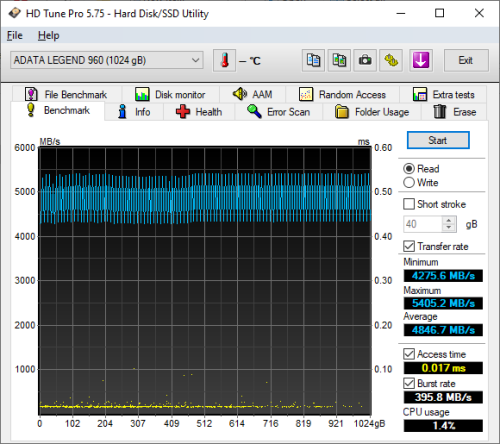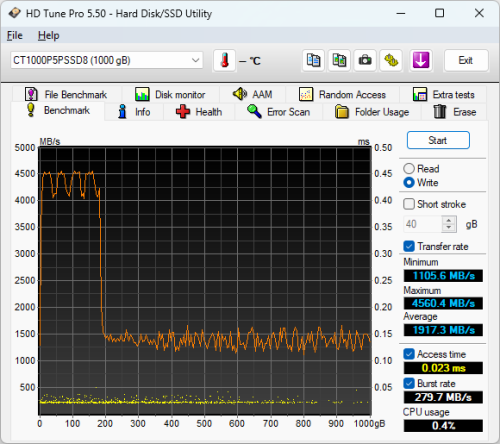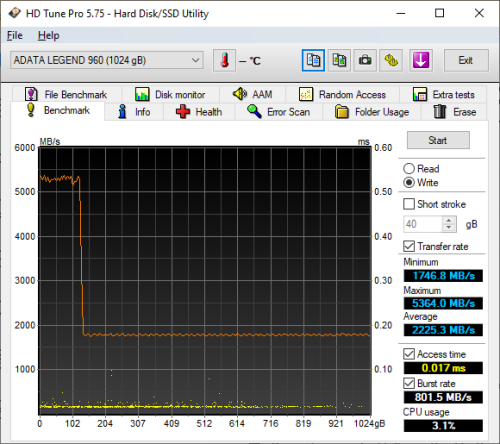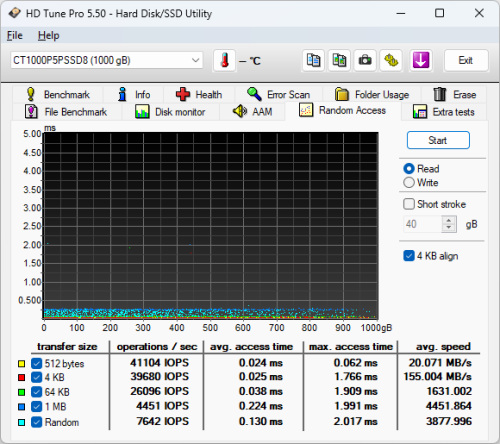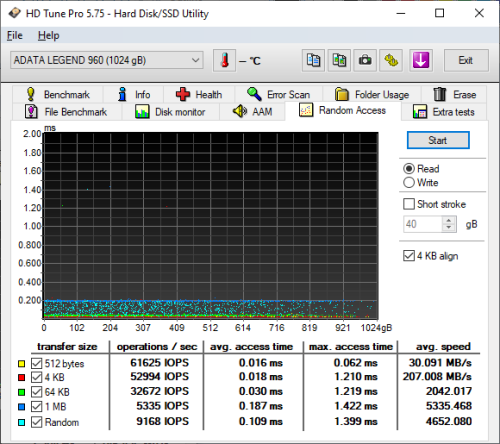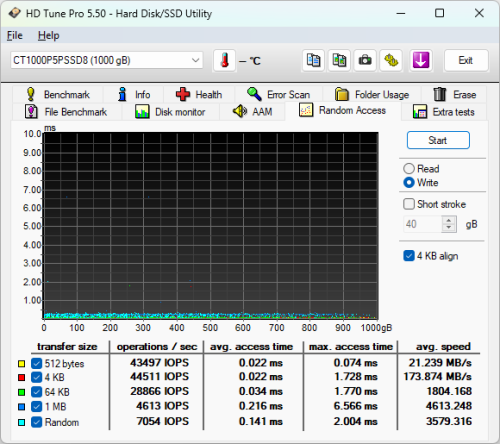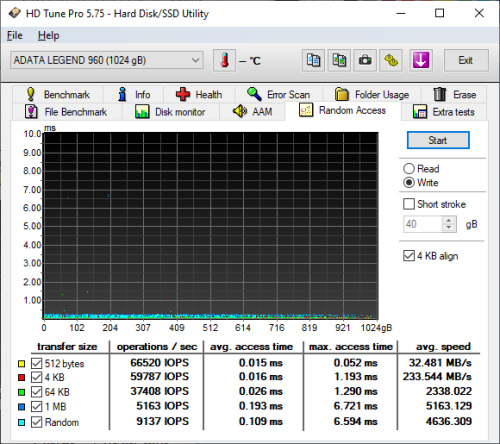

Model: Crucial P5 Plus with Heatsink 1TB PCIe 4.0 Solid State Drive
Manufacturer: Crucial
Provided By: Crucial
Crucial is a global brand of Micron Technology, Inc., one of the largest memory and flash storage manufacturers in the world. The company's product lineup includes award-winning solid state drives (SSDs) and computer memory upgrades (DRAM) for more than 50,000 systems. These products have been qualified and approved by major original equipment manufacturers and every single module has been rigorously tested at the component and module level. Each SSD also undergoes over a thousand hours of prerelease validation testing and hundreds of qualification tests to ensure optimal reliability and performance.
Earlier this year, Crucial quietly released a new version of its award winning P5 Plus SSD. Now available with an integrated heatsink, this M.2 form factor drive is powered by Micron's own DM02A1 controller and is available with up to 2TB of their industry-leading 176-layer 3D TLC NAND flash. The P5 Plus also includes advanced features like full dynamic write acceleration, error correction, full hardware-based encryption, adaptive thermal protection and support for Microsoft's DirectStorage for faster gaming load times. To top it all off, the drive is equipped with an ultra-fast PCIe Gen4 x4 NVMe 1.4 interface and is capable of 6,600 MB/s read and 5,000 MB/s write speeds.
The P5 Plus with heatsink is available in 1TB and 2TB capacities. For this review, Crucial sent us the 1TB version of the drive which is capable of delivering up to 6,600 MB/s sequential read and 5,000 MB/s sequential write speeds as well as up to 630,000 random read and 700,000 random write IOPS.
| Crucial P5 Plus with Heatsink 1TB PCIe 4.0 Solid State Drive | |||||||||||||||||||||||||||
General Specifications
Performance
Reliability
Environmental
Other Features
|
Needless to say, this is only a taste of what the heatsink-equipped version of the P5 Plus has to offer. To give you an idea of what to expect, we'll take a closer look at Crucial's new PCIe 4.0 SSD and then see how well it performs. Does the P5 Plus have what it takes? Can it deliver the performance and features that we've come to expect from Crucial? Keep reading as we find out.
The P5 Plus with heatsink comes in a small, blue and white box. Along with a picture of the drive, the packaging advertises a number of its key features including its 1TB capacity, support for PCIe Gen4 NVMe technology, maximum read speed and 5 year warranty. Inside, you'll find the P5 Plus as well as a small guide with information on where you can get additional help and download the migration and cloning software.

Physical Features:
As I mentioned earlier, the main difference between this version of the Crucial P5 Plus and the one we reviewed previously is the addition of an integrated heatsink. Made entirely out of metal, the heatsink has a series of fins along the top which increases the surface area for greater cooling.

The heatsink wraps entirely around the P5 Plus and is attached using hex screws. While this ensures a solid fit, it also adds to the overall width of the drive. Compared to the original P5 Plus, the heatsink equipped version is about 1mm wider. This doesn't sound like much. However, you will want to make sure that the card doesn't hit a PCI slot or any of the other components on your motherboard. With the heatsink's increased height (8mm), you'll also want to be careful that it doesn't interfere with your video card if your motherboard's M.2 slot is below it. That being said, the heatsink-equipped P5 Plus will fit fine in the PlayStation 5 without any problems.
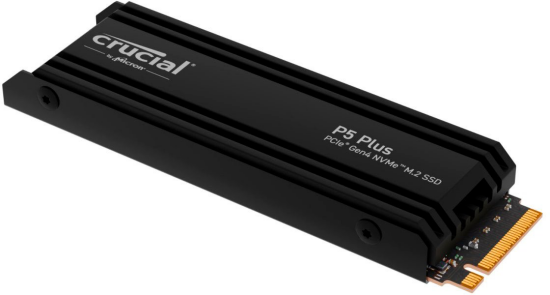
For the 1TB version of the heatsink equipped P5 Plus, Crucial once again opted to use Micron's 176-layer (B47R) 3D TLC NAND flash. If you'd remove the heatsink, you'd see that there are two 512GB NAND flash packages on the top of the PCB. The drive also has a single 1GB Micron LPDDR4 DRAM chip that is used for caching.

The test system used in this review is equipped with an AMD Ryzen 9 7900x CPU, Gigabyte B650E AORUS master motherboard, 32GB (16GB x 2) of Corsair Vengeance 5200MT/s DDR5 memory, Samsung 990 Pro 2TB SSD and a GIGABYTE GeForce GTX 1060 WINDFORCE OC 6G graphics card. For the operating system, I used the latest version of Windows 11.
To test the performance of Crucial's P5 Plus with heatsink, I ran a series of benchmarks using CrystalDiskMark, ATTO Disk Benchmark, AS SSD, HD Tune Pro, Anvil's Storage Utilities, Iometer and PCMark. For comparison, I've also included test results from the Solidigm P44 Pro, Samsung 990 PRO, ADATA LEGEND 960, Crucial P3 Plus, SK hynix Platinum P41, Silicon Power XS70, WD_BLACK SN770, ADATA XPG ATOM 50, ADATA XPG GAMMIX S70 Blade, Crucial P5 Plus, Plextor M10PY, ADATA XPG GAMMIX S70, Sabrent Rocket 4 Plus, WD_BLACK SN850, Silicon Power US70, ADATA XPG GAMMIX S50 Lite, ADATA Elite SE880, Kingston XS2000, ADATA XPG ATOM 30, Samsung 980, Silicon-Power UD70, Crucial P2, SK hynix Gold P31 and Crucial P5.
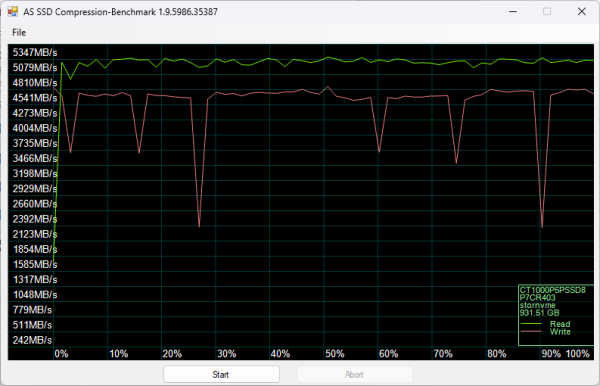
As I mentioned earlier, the P5 Plus with heatsink uses Micron's DM02A1 controller chip. Looking at the screenshot above, you can see that it performs equally well with both incompressible (0%) and compressible (100%) data.
CrystalDiskMark 8.0.4:
First, I ran a few quick tests using CrystalDiskMark. This benchmark measures the performance of a storage device by testing its sequential and random read and write speeds. For this test, we're using the peak and real world profiles.

According to Crucial, the 1TB P5 Plus is capable of reading at 6,600 MB/s and writing at 5,000 MB/s. As you can see, the drive had no problems reaching these speeds in CrystalDiskMark's sequential read and write tests.
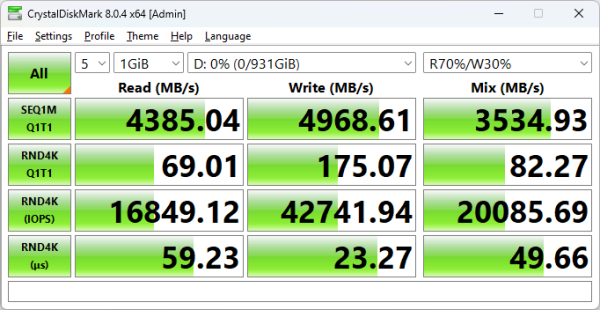
As you'd expect, the P5 Plus wasn't as fast when tested with the "real world" profile which uses a single thread and a much lower queue depth. Nevertheless, it was still able to read at 4,385 MB/s and write at more than 4,900 MB/s.
ATTO Disk Benchmark 4.01:
I also used ATTO Disk Benchmark to test the P5 Plus' sequential read and write speeds. The tests are run using blocks ranging in size from 512B to 64 MB and the total length set to 256MB.
When tested with ATTO, the P5 Plus' read speeds topped out at about 6.36 GB/s and its write speeds at 4.69 GB/s.
AS SSD:
AS SSD is a benchmark designed specifically for solid state drives. The application contains five synthetic tests used to determine the sequential and random read and write performance of a drive.
AS SSD also includes a copy benchmark. This test copies an ISO (two large files), program (many small files) and game (small and large files), returning the speed and duration of each.
HD Tune Pro 5.75:
Next, I ran a series of tests using HD Tune Pro. This hard disk utility measures a drive's performance by testing its sequential read and write speeds as well as its access time, burst rate and CPU usage. For this review, I'm also going to use it to benchmark the P5 Plus' random read and write speeds, random access times and the number of operations per second.
The P5 Plus performed fairly well when benchmarked with HD Tune. The drive had average read and write speeds of 4413.5 MB/s and 1917.3 MB/s, respectively.
When reading 4KB blocks, the heatsink equipped P5 Plus reached 39,680 IOPS and had an average speed of 155.004 MB/s. The drive was even faster when writing, reaching 44,511 IOPS with an average speed of 173.874 MB/s.
Anvil's Storage Utilities:
Anvil's Storage Utilities is another benchmark designed with SSDs in mind. The standard storage benchmark measures a drive's performance by testing its transfer speeds, access times and IOPS.
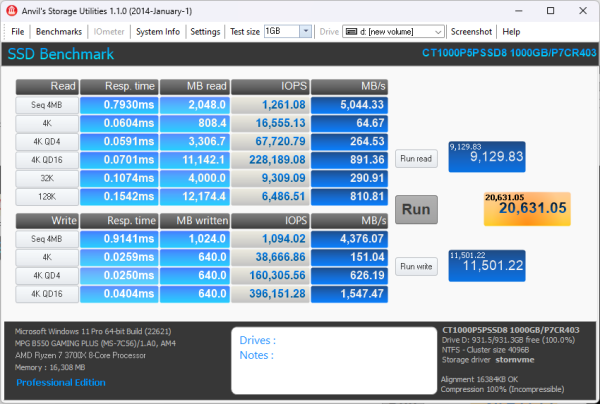
Iometer:
Lastly, I ran a series of tests using Iometer. This tool can be configured to benchmark a number of things. In this case, I used it to measure the P5 Plus' read and write speeds and the number of operations per second. The tests were run using random bytes and a queue depth of 3.

The P5 Plus' performance was very similar to what we saw in our other tests. The drive was able to read at 6183.93 MB/s and write at 4782.89 MB/s.
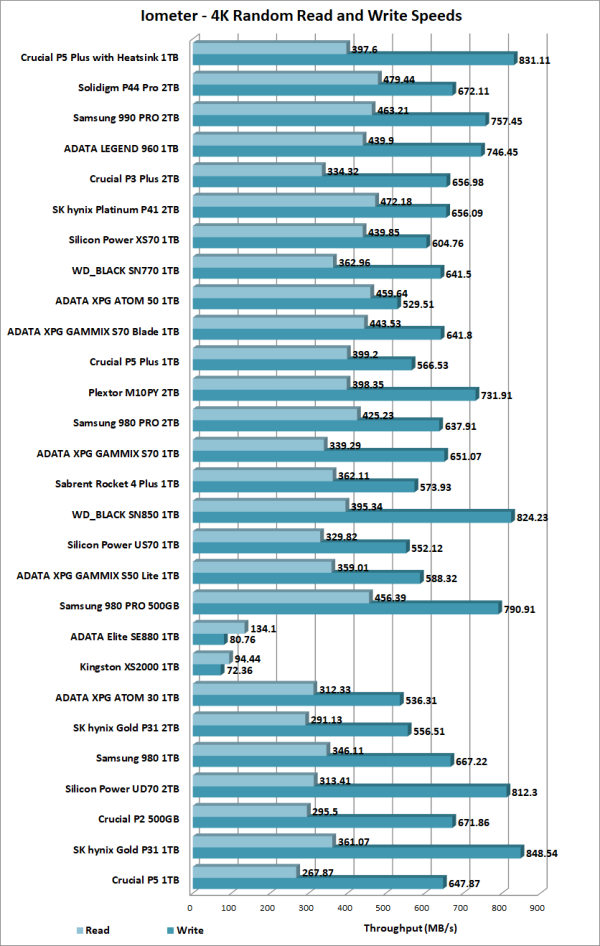
The P5 Plus performed surprisingly well when testing random read and write performance with Iometer. In our tests, the drive was able to read at 397.6 MB/s and write at a respectable 831.11 MB/s.

According to Crucial, the 1TB P5 Plus is capable of 630,000 IOPS when reading and 700,000 IOPS when writing 4K blocks. With two threads and a queue depth of three, the drive reached 101,787 random read IOPS and 212,763 random write IOPS.
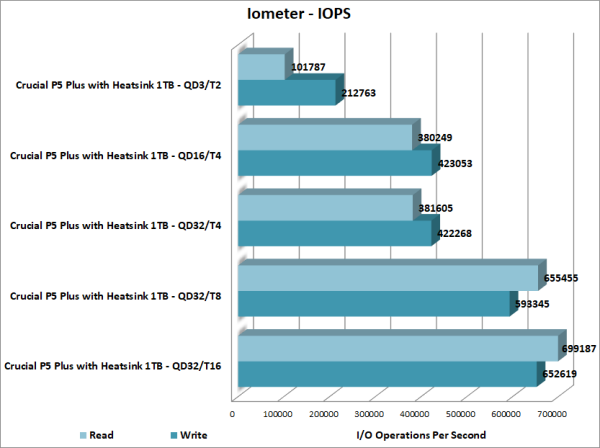
As with most drives, the P5 Plus performed better with more threads and at higher queue depths. With sixteen threads and the queue depth set to 32, it reached 699,187 random read IOPS and 652,619 random write IOPS.
PCMark 8 - Storage Test:
PCMark 8 is a complete benchmark for Windows. It includes five benchmark tests, each designed around a specific scenario. The storage benchmark measures drive performance using real-world traces recorded from Adobe Creative Suite, Microsoft Office and a selection of popular games.
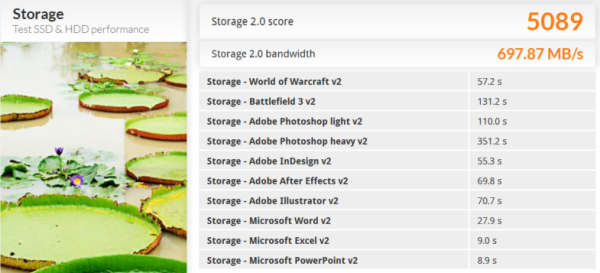
PCMark 8 also includes a consistency test which measures the performance consistency and degradation tendency of a storage system. The test reports the performance level at the start, the degraded steady-state and the recovered state as well as the number of iterations required to reach the degraded state and the recovered state. For this test, we are focusing on the Adobe Photoshop (Heavy) trace and will look at both the bandwidth and latency of the drive

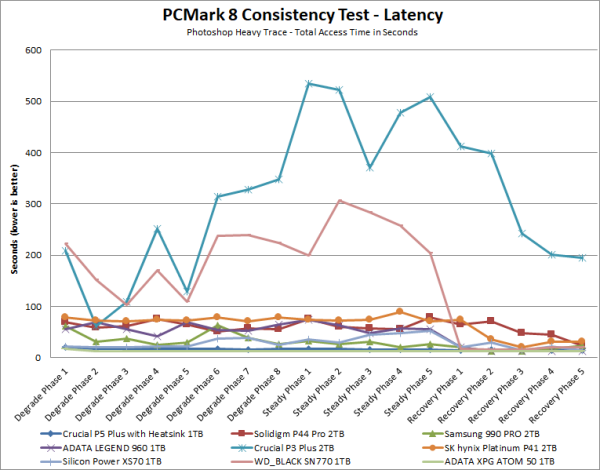
The P5 Plus' performance was hit and miss in this test. While the drive was relatively quick during the degradation and steady phases, its performance was slow to recover. The P5 Plus lagged behind the ADATA LEGEND 960 and the Samsung 990 PRO during the recovery phases, topping out at only 1060 MB/s.
PCMark 10 - Full System Drive Benchmark:
PCMark 10's Full System Drive Benchmark uses a wide-ranging set of real-world traces from popular applications and common tasks to fully test the performance of the fastest modern drives. This benchmark produces an overall score as a measure of drive performance. Comparing devices is as simple as comparing scores. The tests also measure and report the bandwidth and average access time performance for the drive.
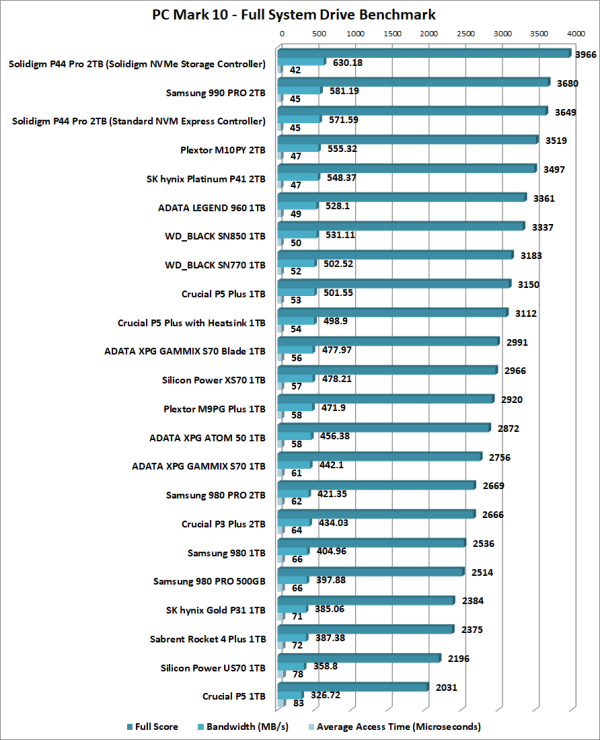
Thanks to its high bandwidth and low latency, the P5 Plus did quite well in PCMark 10's Full System Drive Benchmark. Unfortunately, this wasn't enough to top the Solidigm P44 Pro or the Samsung 990 PRO.
Adaptive Thermal Protection:
While PCIe SSDs like the P5 Plus offer impressive performance, they also generate a good amount of heat. To keep them from overheating, Crucial has implemented what they call Adaptive Thermal Protection. This technology monitors the temperature of a drive and will automatically reduce its performance when it reaches a certain point.
With the original P5 Plus, the temperatures hovered around 50 ºC while idle and would climb up to 76 ºC when pushed hard. At this point, Adaptive Thermal Protection would kick in and throttle the drive's performance.

As you'd expect, the heatsink had a big impact on the P5 Plus' temperatures. At idle, the drive's temperature averaged about 39 ºC. Under heavy loads, the drive reached temperatures as high as 62 ºC when reading and 58 ºC when writing. With the temperatures staying well below 76 ºC, there was no sign of thermal throttling.
Final Thoughts:
The heatsink-equipped version of Crucial's P5 Plus SSD is finally here and, like the original, it's a great choice for the gamer or creative professional looking for a fast, yet affordable, PCIe 4.0 SSD for their computer or PlayStation 5 gaming console. Designed and built entirely in-house, this M.2 form factor SSD is powered by Micron's DM01B2 controller and is available with up to 2TB of the company's 176-layer 3D TLC NAND flash. Combine this with a PCIe Gen4 x4 NVMe 1.4 interface and you have drive that is nearly twice as fast as Crucial's Gen3 PCIe SSDs. The P5 Plus flew through our sequential transfer rate tests, reading at speeds as high as 6,800 MB/s and writing at more than 5,000 MB/s. The drive also did surprisingly well in our random write tests, producing nearly 212,000 IOPS at low queue depths.
Of course, fast read and write speeds aren't the only things the P5 Plus has to offer. In addition to its integrated heatsink, the drive uses technologies like Dynamic Write Acceleration to optimize performance as well as multistep data integrity algorithms and Redundant Array of Independent NAND (RAIN) to protect data and prevent it from becoming corrupted. The P5 Plus also features thermal and power loss protection, active garbage collection, NVMe Autonomous Power State Transition (APST) support and full hardware-based encryption. To top it all off, the drive is optimized for Microsoft’s DirectStorage API and is covered by a generous 5 year warranty.
The Crucial P5 Plus is available now with the heatsink in 1TB and 2TB capacities and retails for $63 and $123, respectively, on Amazon.com. If you don't need the heatsink, the original P5 Plus can also be picked up for about $10-$20 less.

Highs:
- Integrated heatsink
- Available in 1TB and 2TB capacities
- PCIe 4.0 x4 interface with NVMe protocol
- Micron DM02A1 controller
- Equipped with Micron 176-layer 3D TLC NAND
- Good sequential and random read and write performance
- Small M.2 2280 form factor
- Large DRAM cache
- Dynamic Write Acceleration
- Supports Redundant Array of Independent NAND and Multistep Data Integrity Algorithms
- Full hardware-based encryption
- Supports TRIM and active garbage collection
- Thermal and power loss protection
- Optimized for Microsoft’s DirectStorage API
- Works with PlayStation 5
- Includes Acronis True Image cloning software
- 5 year warranty
Lows:
- Write speed drops when SLC cache is full
